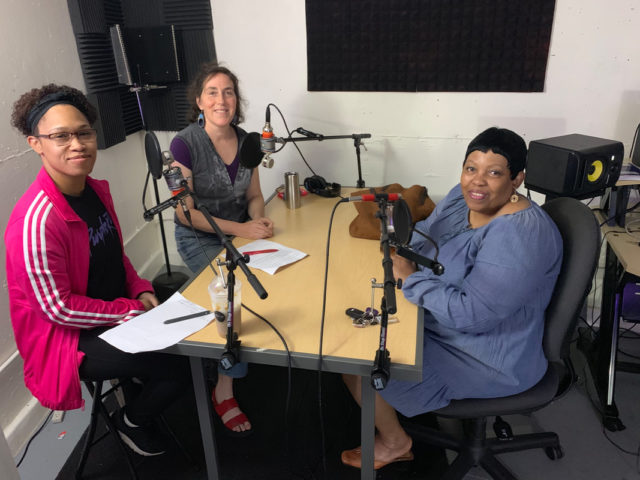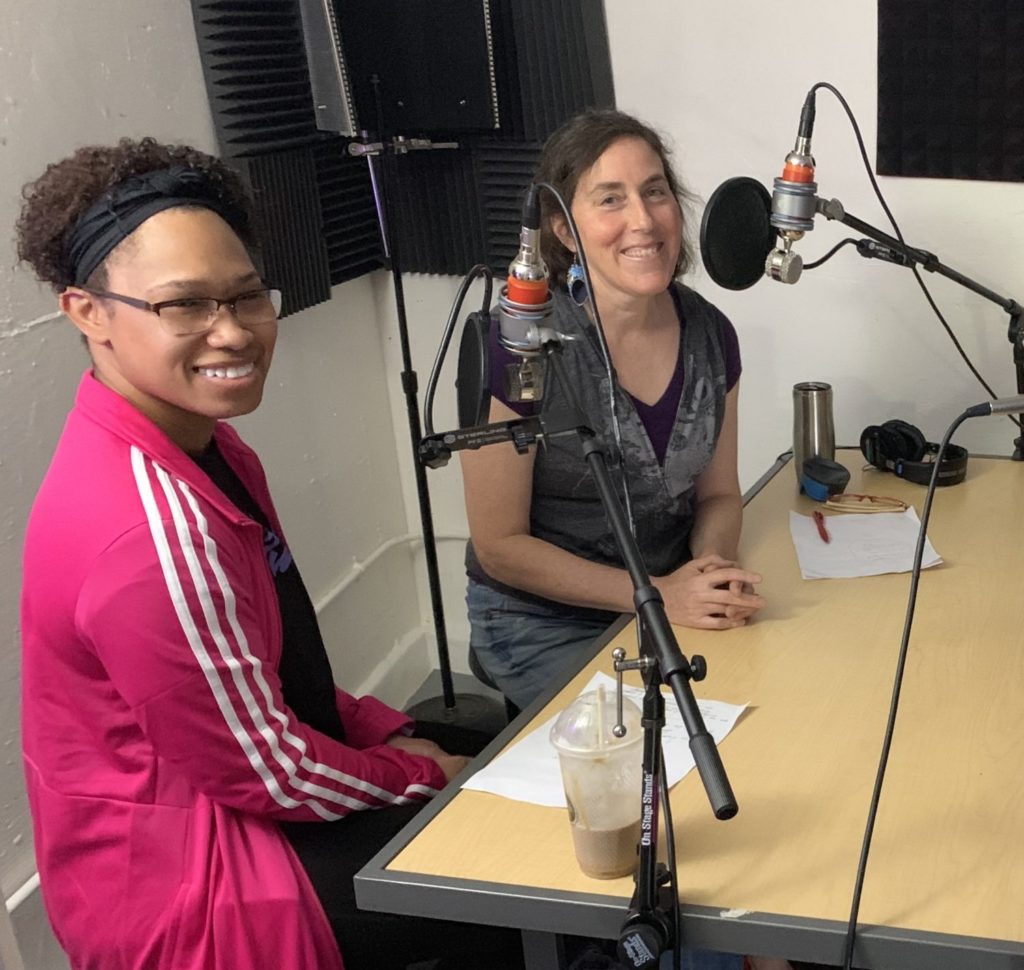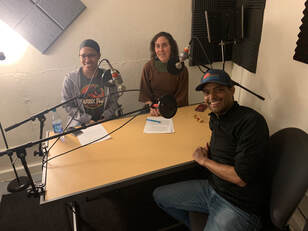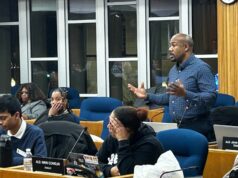
“I’m a big fan of storytelling. If someone tells a story well it can affirm a truth that the listener already knew, it can deepen someone’s understanding, it can lower fences and it can amplify voices,” says Jen Rubin. “There are so many great things storytelling can do. There are so many great places around Madison where people tell stories but the only people who hear it are in that room.”
And that’s where “Inside Stories” podcast comes in, where writers, storytellers and co-hosts Rubin and Takeyla Benton are able to highlight and amplify autobiographical stories originally told at venues or programs like Moth StorySLAMs, University of Wisconsin-Madison’s Odyssey Project, Madison Story Slams, or Sustain Dane’s storytelling projects.
“To me, I feel like a story told live in front of a crowd just has a different energy,” says Rubin, a former New Yorker living in Madison who is a co-producer of Moth StorySLAMs. “I’m happy that we’ve been able to take some of these stories that have been told in various pockets of Madison and put them out through a podcast. And we get to go a little deeper in the story. For the listener, it may make you rethink something or feel less alone.”

Through “Inside Stories” podcast, Rubin and Benton are exploring Madison one story at a time. In each episode, they feature a story told live in Madison in front of a crowd. They sit down and interview the storyteller to dig deeper into the story and talk about how they crafted it.
“Sometimes I feel like if you see a picture or hear a snapshot of a story, everything is a Rorschach test for everyone – you put your own understanding of the world on that picture or on that story, especially if it doesn’t go into enough detail,” Rubin says. “So, through the interview, we can maybe pull out some things.”
Benton, who founded “We Write Too,” an online space where black women can seek writing advice, remembers when the idea was first hatched.
“We were doing the [storytelling] workshops through [University of Wisconsin-Madison] Odyssey Project’s [writing class] and we were doing a few other ones around town for UW. Jen and I kept coming together and meeting to do the workshops and stuff like that,” Benton remembers. “We both separately had ideas for podcasts. She brought it up to me and asked me if I’d be interested and we started to formulate what it could be if we did it together.
“I’m really interested in how one puts together a story. Because I do so many workshops, I know that people in that world always want to know how a story is put together,” adds Benton, who has also served as co-producer for Madison’s “Listen to Your Mother” show. “In addition to just interviewing people about the story, we also try to spend a little bit of time to find out ‘why did you do that?’ or ‘How did you put that together?’”
“Inside Stories” is produced by UW First Wave hip-hop alum Richard Jones of Oddly Arranged Media.
“Richard has been wonderful for us,” Rubin says. “We record in the Oddly Arranged Media space, and he does the editing and mixing of each episode. We are their first podcast and since we started working with them, they have increased their capacity to record other podcasts.”
They’ve already recorded 10 “Inside Stories” podcasts; so far 8 have been released.
“We look at audio that we can potentially get – some things from The Moth or the Odyssey Project, Madison storytellers, Listen to your Mother,” Rubin says. “Right now, it’s people that we’ve known and stories that we’ve heard.”
How deep and personal do people get during these podcasts?
“We’ve been trying to limit it to 30 minutes; I don’t know if we’re going to extend that or not,’ Benton says. “Some people get really, really deep. It really depends on the questions that we ask sometimes. But we get some good depth in finding out the background of the stories. We get information on how they formulated their stories, why they decided to tell their story in the first place, why is it meaningful to them, etc. For many, they come in and get pretty personal.
“I think Jen and I are both really good storytellers. Her angle is a little bit different than mine, I believe,” Benton continues. “She’s more about interviewing for the sake of finding more about the story and how they got to that point whereas I’m more interested in how the story affects their lives and how they move forward with it and what do they do with it in their everyday lives.”
The episode featuring Tandalaya Taylor has been a favorite for both Benton and Rubin. Taylor tells a story about her love of daydreaming, how her cancer diagnosis and health struggles took away her desire to daydream and how she survived and altered her dream. Taylor’s brother recorded a snippet of that conversation (above).
“People who have really listened to it have liked it, but I’d say the one that has gotten the most listens and that I’ve heard the most about is Tandalaya’s,” Rubin says. “It was about figuring out how to daydream again after dealing with cancer. I have people that I know around the country that do cancer work and so I sent them the link and they responded, ‘Oh, my God. My colleagues loved it!’
“And we loved that one, too. It was just such a fun conversation,” she adds. “I think Takeyla and I have gotten better at interviewing as we’ve been doing this.”
In one podcast, Lenora Rodin tells a story about her addiction and recovery. Rubin, Benton and Rodin talk about how a hard story and a funny story can be the same story and Rodin, an Odyssey alum, talks about the importance of telling the truth about herself. In another podcast, Jennifer Esperanza tells a story about growing up as the child of an immigrant and what she was able to get away with as her parents didn’t fully understand how everything worked in America.

Rubin says that she has talked with people from Wisconsin Public Radio about broadcasting some of the stories from the show.
“Maureen McCollum, she produces Wisconsin Life for WPR, will put some of these stories up on Wisconsin Life,” Rubin says. “We’re hoping to feed her ones from the Odyssey Project. I think those would be great stories to feature. Tandalaya will be on Wisconsin Life at the end of the month.”
For Benton, her favorite part of this new endeavor is listening to people’s stories and then asking them how it affects their lives.
“There is so much sometimes. Stories connect us in so many different ways; that’s how humans connect tribally – by telling stories,” Benton says. “Just to be able to talk about different things that happened in their lives and how it led them to this point and how they move forward with it. It’s so interesting to me.
“It’s usually life-changing when somebody has a really good story to tell. It’s because something changed and that story is evidence that this thing happened, I changed and here’s the story. Even if it’s a small-scale thing,” she adds. “It’s cool to hear it and to pick their brain about it.”
The goal of “Inside Stories” is to keep getting the word out about our podcast – both in order to get more subscribers but also to learn about storytelling events or recordings that they don’t know about it and to broaden the stories they share.
“We want to keep building our audience,” Benton says. “We’re pretty artsy here in Madison which is pretty cool. We have a bunch of different spoken word/artistic stuff/plays. We have a lot going on. I would love more storytelling scenery to come out. I would love to incorporate this into the spoken-word scene.
“Make this where you do an open mike somewhere or you go to The Moth or you do something for Odyssey or The Storytellers and you hope to get called by ‘Inside Stories,'” she adds. “I want it to be that big of a deal.”

































